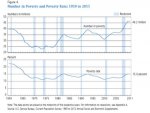- Joined
- Jan 28, 2012
- Messages
- 16,386
- Reaction score
- 7,793
- Location
- Where I am now
- Gender
- Male
- Political Leaning
- Independent
Officially - but emotionally (for me) as well. If I had the power to change the official unemployment rate, that is what I would change it to (as of now).So, regardless of whether we're talking scientifically/technically in economics or casually or emotionally?
why do you think they would do that when they never have before? They clearly and demonstrably have never changed the unemployment parameters.
And why have they never done this before? Or are you claiming you have evidence of secret internal changes?
What are you talking about?
Of course the criteria of the official unemployment rate has changed...several times. You listed three of them in the OP.
Plus, the definition of 'discouraged workers' has changed - which effects the unemployment rate.
https://harvest.cals.ncsu.edu/are201/unempmsr.html
Last edited:

